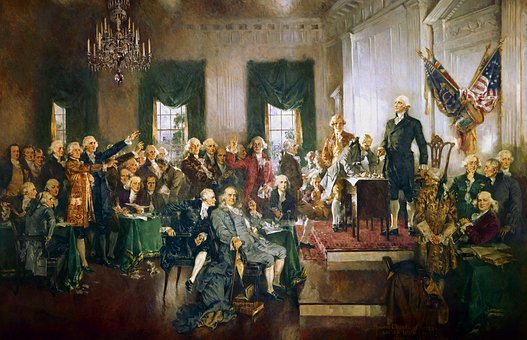Archived Blogs
|
I grew up in Philadelphia where The Constitution was said with the same reverence as the Bible. We took school trips to the city, went on guided tours of historic buildings and memorized details for the test that would follow.
The Declaration of Independence was written in 1776 and was designed to justify our separation from British rule. The Constitution was written in 1787 and was designed to be the law of our new country. But, these facts held no importance to me, I was more interested in cell structure and mitosis. And I was working on the premise that these men had done a good job and created a timeless document that would serve us for all eternity. But then I learned about Heidi Schreck and her Broadway performance of What the Constitution Means to Me. During her teenage years, Heidi toured the country speaking about the Constitution. In fact, she made enough money doing this that she was able to pay for her own college education. She’s been studying this document for a long time so I have to believe she knows what she’s talking about. She points out that the Constitution has positive and negative rights. Negative rights protect us from our own government becoming too powerful. Positive rights, like the right to an education, help our citizens to succeed. Sounds pretty good, so what’s the big deal? She explores the document and how it relates to her family, especially the women. She argues that women weren't always protected as well as they should have been. The Equal Right Amendment was a proposed amendment that was supposed to give equal legal rights to all citizens regardless of sex. But it never passed. Alice Paul, a suffragist, initial wrote a version that said “Men and women shall have equal rights throughout the United States and every place subject to its jurisdiction.” Despite being in every Congressional session for the next 20 years, it never passed. In 1943, the words were changed to: “Equality of rights under the law shall not be denied or abridged by the United States or by any State on account of sex.” The ERA amendment was gaining traction when Phyllis Schlafy (1924-2016) stepped in the ring. Schlafly was vigorous in her objection to the potential amendment and she was effective at bringing it to a halt. She claimed that if equal rights were granted women would be forced to go to war, they would lose their rights to child support and alimony and our society would collapse. But not to worry. Surely there are protections for women in other places? The Fourteenth Amendment is supposed to allow equal protection under the law for all citizens. An article from the Atlantic said: In an interview with California Lawyer magazine, Supreme Court Justice Antonin Scalia seemed to suggest that the Constitution does not protect women from gender-based discrimination. "Certainly the Constitution does not require discrimination on the basis of sex. The only issue is whether it prohibits it. It doesn't. Nobody ever thought that that's what it meant. Nobody ever voted for that," said the famously conservative justice, adding, "If the current society wants to outlaw discrimination by sex, hey we have things called legislatures, and they enact things called laws. So should we be pursuing equal rights now? Abigail Adams, in a letter to husband John Adams, warned “Do not put such unlimited power into the hands of the Husbands. Remember all Men would be tyrants if they could.” And what about RBG (Ruth Bader Ginsberg). What does she say? You can hear for yourself here. RBG is famous for her support of equal rights...for everyone.
1 Comment
|
Archives
October 2020
Categories |
COPYRIGHT 2017 SUSAN BADARACCO | Site Credits


 RSS Feed
RSS Feed